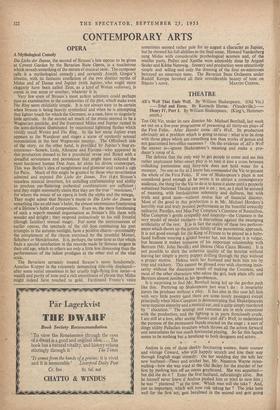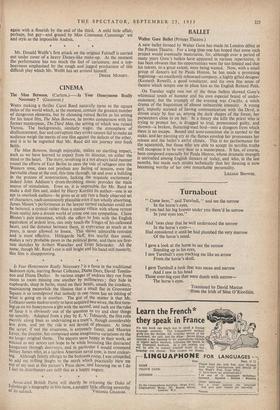THEATRE
All's Well That Ends Well. By William Shakespeare. (Old Vic) —Trial and Error. By Kenneth Home. (Vaudeville.) Henry IV, Part 1. By William Shakespeare. (King's, Hammer- smith.) THE Old Vic, under its new director Mr. Michael Benthall, last week set out on a five-year programme of presenting all thirty-six plays of the First Folio. After Hamlet came All's Well. Its production obviously set a problem which is going to recur : what is to be done with those plays which are something less than works of genius and not guaranteed box-office successes ? On the evidence of All's Well the answer is—ignore Shakespeare's meaning and make a pro- ducer's romp of it.
The defence that the only way to get people to come and see this rather unpleasant bitter-sweet play is to turn it into a cross between rollicking pantomime and fairy-tale does not hold water for a moment. No one so far as I know has commanded the Vic to present the whole of the First Folio. If one of Shakespeare's plays is not considered good enough as he wrote it to attract a contemporary audience, the thing for the Vic to do is to leave it alone until a properly subsidised National Theatte can put it on ; not, as I shall be accused of meaning, with bardolatrous solemnity and dullness, but with truth and good taste—without undue fear of financial disaster. Most of the good in this production is in Mr. Michael Hordern's. horribly real and truly pointed performance as the boastful cowardly militarist, Parolles, and Miss Fax Compton's Countess of Roussillon. Miss Compton's gentle sympathY and sincerity—the Countess is the very model of model mothers—is marvellous against, the swamping artificiality of the rest. Its in fact the reality of these two perform- ances which shows up the artistic falsity of the pantomimic approach. It is not, good enough for the King of France to be played as a baby- faced buffoon wearing a gilded bowler hat, not because it is vulgar, but because it makes nonsense of his important relationship with Bertram (Mr. John Neville) and Helena (Miss Claire Bloom). it is not possible to shirk the unheroic quality of the heroine without leaving her simply a pretty puppet drifting through the play without a proper motive. Helena weds her husband and beds him too by trap and trickery. This cannot be glossed over with charming insin- cerity without the disastrous result of making the Countess, and most of the other characters who adore the girl, look plain silly and Bertram almost justified in his ignobleness. It is surprising to find Mr. Benthall being led up the garden path like this. Prettying up Shakespeare just won't do : it invariably leaves the producer without a play. It has also in this case left him with very little poetry (and there are some lovely passages) except principally when Miss Compton is demonstrating that Shakeepearean verse requires sincerity and a musical ear, and is quite simply murdered by " elocution." The settings and costumes are in style consonant with the production, and the lighting is in parts ferociously crude. I am still at a loss, after seeing Hamlet and All's Well, to understand the purpose of the permanent façade erected on the stage ; a sort of dingy utility Palladian structure which throws all the action forward and necessitates far too much horizontal playing. So far this facade seems to be nothing but a handicap to both designers and actors.
Andrea is one of those sleekly fascinating women, haute couture and vintage Coward, who still happily scratch and kiss their way through English stage comedy. On her wedding day she tells her new husband—Times and cricket bat, Mr. Naunton Wayne stone- walling—how she was tried at the Old Bailey for the murder of her first by pushing him off an ocean greyhound. She was acquitted— but did she do it ? Enter the first husband, infuriatingly alive. But he himself never knew if Andrea pushed him or tried to save him ; he was " plastered " at the time. Which man will she take ? And, just as important, which will now risk taking her ? The joke lasts well for the first act, gets becalmed in the second and gets going again with a flourish by the end of the third. A mild little affair, perhaps, but gay—and graced by Miss Constance Cummings' wit and style as the impossible Andrea.
* * *
Mr. Donald Won's first attack on the original Falstaff is carried out under cover of a heavy Disney-like make-up. At the moment the performance has too much the feel of caricature, and a top- heaviness emphasised by the rough and jagged production of this difficult play which Mr. Wolfit has set around himself.
DEREK MONSEY.



































 Previous page
Previous page